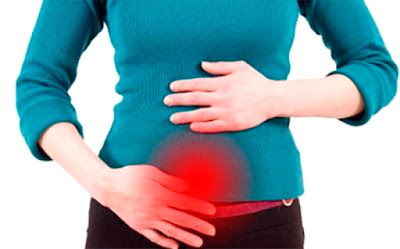There is a constant urge to urinate - but urination is uncomfortable, it hurts or burns. In most cases, however, the infections are harmless.
Cystitis is the most common urinary tract infection (UTI). Women in particular often suffer from it, sometimes several times a year. In men, the infections occur more frequently with age. Doctors sometimes prefer to speak of a urinary tract infection because the bladder alone is rarely affected.
Bladder infections are sometimes very uncomfortable. Urination can burn, the urge to urinate can be constant, and the lower abdomen can hurt. But most bladder infections are harmless and go away after a few days. The risk of a rare complicated course is increased in certain groups of patients (e.g. pregnant women, people with a weakened immune system or kidney diseases).
The vast majority of bladder infections occur because bacteria enter the bladder through the urethra. Other causes are considerably less common. Risk factors include female gender, frequent sexual intercourse, certain contraceptives, excessive personal hygiene, hormone treatments, and others.
 |
| what is cystitis? |
Causes and risk factors
The vast majority of bladder infections are caused by bacteria from the intestine (Escherichia coli). They get into the urethra during sex, through improper wiping, or other circumstances, and ascend to the bladder. Other types of bacteria, such as those that can cause STDs, are rarely found in bladder infections, and viruses or fungi are even rarer.
Risk factors
Risk factors are divided into those that cannot be influenced and those that can be influenced. You can do something about the latter – i.e. prevent bladder infections. For this reason, the risk factors that can be influenced and countermeasures follow in the “Prevention” section. Here are the uncontrollable risk factors that cannot be changed.
- Female : The female urethra ends closer to the anus and is significantly shorter than the male. Therefore, it is easier for intestinal bacteria in women to get into the urethra and from there ascend to the bladder.
- Pregnancy: During this time, hormones widen the urinary tract and change the properties of the urine. The pressure conditions in the abdomen change. This increases the risk of complications. In one in three pregnant women, a bladder infection leads to an acute inflammation of the renal pelvis.
- Menopause (postmenopause): The decline in estrogen weakens the protective function of the vaginal mucous membranes and the vaginal flora. Local hormone treatments can help.
- Family predisposition – frequent bladder infections in the family.
- Previous bladder infections, especially those that started when you were young, increase the risk.
- Illnesses, medication and surgical interventions can influence the risk, such as urinary flow disorders (e.g. due to bladder prolapse, urinary stones, tumours, narrowing of the urethra, benign prostate enlargement) and other diseases or malformations can lead to residual urine and urine reflux into the ureter. Gout increases the risk of urinary stones. The urine of diabetics contains sugar, which serves as food for bacteria. In addition, their immune system is weakened. Other chronic diseases and some medications (immunosuppressants, e.g. cortisone) have similar effects. Antibiotics can adversely affect the vaginal flora. Operations and minor interventions in the urinary tract (e.g. cystoscopy, bladder catheter) often allow pathogens to enter the body. Many patients contract a bladder infection in the hospital.
Symptoms
Does it burn or hurt when you urinate?
Do you have to go to the toilet more often than usual because of the urge to urinate?
Do you have pain in the bladder area?
Then it is very likely that you have a bladder infection. Its most common symptoms are burning or painful urination and frequent, strong urges to urinate. With mild infections, they can appear as the only complaints, more severe bladder infections are usually associated with other symptoms. In many cases, the urethra is also inflamed. In the course of this, bladder infections can rise and lead to infections in the renal pelvis, which are considered a complication. In patients who have an increased risk of complications, physicians generally rate cystitis as complicated; all others are considered uncomplicated. In principle, bladder infections and their consequences can have all the so-called key symptoms of urinary tract infections. Under this umbrella term, other, partly similar diseases and details of the key symptoms are listed.
The most common symptoms of bladder infections are: pain, burning when urinating, frequent, sometimes strong urge to urinate and mild to severe pain in the lower abdomen (bladder region).
Common symptoms are painful urination and difficult voiding. The bladder spasms before urinating. The urge to urinate can be so strong and painful that it is impossible to delay going to the toilet (urgent urination). Many sufferers can only relieve themselves by small amounts of urine. The urge to urinate more often can also be felt at night. The urine may become cloudy and its smell may change. Discharge from the urethra is also possible.
Occasionally, additional complaints appear. Imperative urination can cause sufferers to lose urine before they can reach the toilet (urge incontinence). Occasionally patients are no longer able to urinate because of their pain (urinary retention).
Blood in the urine (hematuria) can sometimes occur with a bladder infection. A doctor should always investigate the cause.
Unusual for simple bladder infections and to be clarified by a doctor are a clear feeling of illness, fever, chills, nausea, pain above the bladder, e.g. on the side of the body (flank pain), on the back and in the kidney region. These symptoms usually indicate that the infection has ascended into the upper urinary tract (ureters, renal pelvis): organ damage and other complications are possible.
